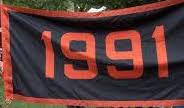
1991. I think about it all the time. It’s critical. In fact, nothing could be more important.
Okay, you say, I’ve finally lost it. The year 1991 was hardly a memorable one. It was the year that Dan Quayle was veep, Clarence Thomas joined the Supremes, and Dr. Seuss passed away. Those are the 1991 headlines. Why in heaven would anyone be obsessed with 1991?
Because I’m referring to 1991, the actual number, not the calendar year. It’s the number of delegates that a Democratic candidate for President must win in order to be declared the party’s nominee.
So, if Bernie Sanders has 1991 votes in his pocket at the time of July’s Democratic National Convention, we are facing certain defeat and another four years of demagogue Donald Trump–and perhaps more when he attempts to declare that term limits a thing of the past. We are facing the prospect of a Republican House AND Senate that will do anything the supreme ruler says. And we are facing a Supreme Court where two right wing hacks will have replaced Ruth Bader Ginsburg and Stephen Breyer.
So 1991 means a lot!
But, I tell myself, what if Bernie doesn’t have 1991 pledged delegates by the time of the convention? Then maybe, just maybe, there’s hope, if your definition of hope begins with chaos. If no clear winner, Mr. or Ms. 1919, emerges on Round 1, then we go to Round 2, where we end up with what’s called a brokered convention.
In the second round of voting, technically all of the various candidates’ delegates—and they number an unwieldy total of 3979–are released from voting for the person for whom they were sent to the convention to vote for. To top that off, at that point an additional 771 superdelegates, pledged to nobody but the Party, are set loose upon the voting.
This inelegant and bizarre system will result in the selection of one candidate, maybe on Round 2, maybe on Round 17, who exceeds 1991. Whomever he or she is, almost everyone will be frustrated, exhausted, and unhappy, and the Democrats will send forth a candidate of chaos and compromise rather than a candidate of choice. The last time this happened to the Dems was 1952, and Adlai Stevenson was the one person left standing when the dust had cleared. You remember him, of course. Who could forget President Stevenson?
So I’m for a slightly modified version of Tom Friedman’s NY Times proposal, his idea of a “national unity ticket” based on Lincoln’s nineteenth century concept of a team of rivals. In order to be guaranteed a winning number of delegates, the eventual nominee as well as the also-rans would all have to openly state to the convention that they would agree to something revolutionary: that they would run for the White House as a “team.” Fallen rivals going back to Cory Booker, Beto O’Rourke and Kamala Harris (but, please, not wacky Marianne Williamson) would pledge, not just to support the ticket, but to participate actively in the administration of the new President. Biden could agree—in advance—to be Bernie’s Secretary of State. Or Pete could agree to be Bloomberg’s Secretary of Homeland Security. Or Amy could consent to serve as Ambassador to the Midwest (or some equivalent, but important, position).
In this way, voters who had some positive emotional attachment to any one of the contenders could identify with and vote for a set of exemplars who would defeat Trump and bring sanity back to government. Voters whose favorite candidate had not been successful could still feel that they and their person would be part of the solution, actively representing their values and restoring order in the wake of MAGA.
I like the idea. I like it so much that I’m sure it will never happen.
In the meantime, I guess that the best we can do is to cling to hope and raise a toast to 1991.